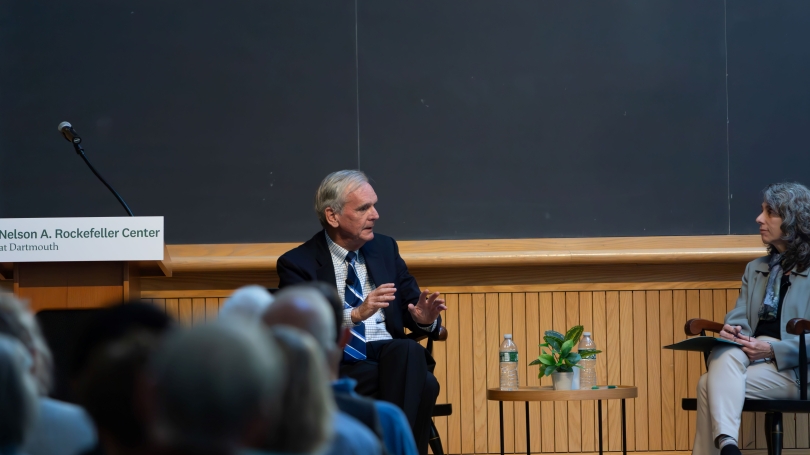
- Public Policy
- Leadership
- Funding
- News & Events
- About the Center
Back to Top Nav
Back to Top Nav
Back to Top Nav
Back to Top Nav
On Thursday, September 28, 2023, The Rockefeller Center hosted former Senator Judd A. Gregg in the Hinman Forum to deliver the 2023 Perkins Bass Distinguished Lecture. In the talk, which was hosted by Anna Mahoney and moderated by Professor Kirstin Smith, Sen. Gregg discussed why he believes bipartisanship is eroding and how the Senate can bring back compromise-driven governance.
Sen. Gregg began his talk with a story about Rep. Charles Bass '74, whose father, former Gov. Perkins Bass '34, graced the name of Sen. Gregg's lecture. He explained that "Charlie" is a close friend whose campaign jingle would entertain Sen. Gregg's daughter as she was driven to elementary school. Rep. Bass succeeded Gregg in Congress after his successful run for governor in 1989.
Gregg went on to lament the loss of an "attitude of congeniality" in American politics. He referenced the Washington and Lincoln administrations as evidence for partisanship without antagonistic gridlock.
"Partisanship is not unique," Gregg explained. "But the difference is that when we were there, there was also a goal to govern."
Referring to his own career, Gregg explained how he worked with Sen. Ted Kennedy (D-MA) and Reps. John Boehner (R-OH) and George Miller (D-CA) to author the No Child Left Behind Act of 2002.
"The disagreements were intense," Gregg said. "But we would meet for hours on end to hammer out where we thought the federal government could help with elementary and secondary education."
According to the Senator, there are four main causes for the recent decline in bipartisanship. He faulted gerrymandered districts in the House of Representatives, a growing tide of populism, the collapse of political parties, and a rise of the regulatory state for driving politicians apart.
Gregg argued that primary voters are more extreme than general election voters, which motivates candidates to appeal to the base of the party that does not believe in compromise. He referenced Madison's vision for a system that "forced compromise" by bringing people together despite views or backgrounds. According to Gregg, Madison's vision is being lost because of the rise in gerrymandered congressional maps.
"Sixty to sixty five percent of House [of Representatives] seats are now single party seats," Gregg lamented. "In other words, if you win the primary, you win in that district."
Gregg proceeded to discuss populism, which he argued has also driven anti-compromise sentiment. He acknowledged that there has always been a populist strain in American politics, but noted that populism has never been a dominant force until now. He blamed social media for creating a "disproportionate megaphone for the fringe elements within our political dialogue [that] drown out rational discussion of complex issues."
Gregg's main concern with populism is that it takes away the presence of thoughtful discussion "in the middle" which is where he believes compromise and progress take place. His emphasis on fostering conversations between moderates was a theme throughout the talk, which stems from his experience as a moderate dealmaker in the United States Senate.
In addition to rising populism reducing the middle, Gregg also blamed political parties for drifting further away from each other. He labeled the main American political parties as cults that cannot be controlled, likening the dysfunction to European-style coalition governments.
Gregg finished his explanation for the collapse of compromise culture by characterizing regulatory agencies as overreaching their roles.
"Congress has been incapable of basic government because it has ceded the ground of governance," Gregg reasoned. "That vacuum has been filled by unelected people who regulate and over time, become totally independent."
According to Gregg, the federal bureaucracy's only institutional accountability is the court system, which has changed the nature of policy making.
Gregg moved on to address the younger attendees of his talk, imploring them to give greater importance to two core issues: the fiscal debt and relations with China. In Gregg's view, the rising GDP to debt ratio, which is now 110%, will "translate into a destruction of standard of living" if the countries buying American debt no longer believe in its credibility. He also emphasized that America's current China policy is untenable because a war would be catastrophic due to China's significantly larger population.
To finish out the talk, Gregg focused on the institution he knows the best: the United States Senate. He referenced Washington, who described the Senate as the saucer that cools the hot coffee, to explain why the Senate could be a "breath of fresh air" in such a polarized environment. According to Gregg, the Senate was designed to foster compromise by giving the minority party protection through the filibuster.
"The Senate does have the capacity to work on big problems and reach solutions," Gregg said.
He pointed to the recent dress code agreement and continuing budget resolution for evidence that the Senate can still work. In his eyes, through strong individual leadership and a willingness to work with others, we can overcome the challenges he laid out in the earlier portion of his talk.
"America is an inherently resilient nation," Sen. Gregg concluded. "This too shall pass."
Written by Varun Swaminathan '26, Rockefeller Center Student Assistant for Public Programs